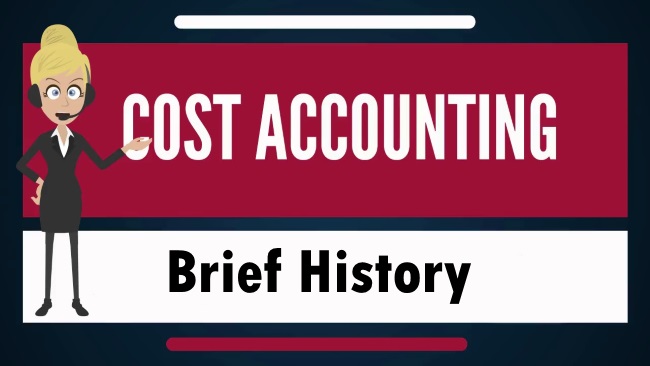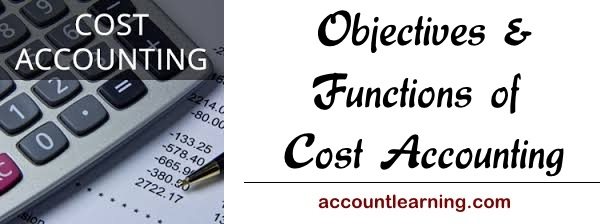Cost Accounting | Brief History | Objectives | Functions
Table of Contents
- 1 History of Cost Accounting
- 2 Objectives of Cost Accounting
- 2.1 1. Knowing of Cost
- 2.2 2. Exercise Control over Cost
- 2.3 3. Formulating Policies
- 2.4 4. Fixing the Selling Price
- 2.5 5. Maximize Output and Profit
- 2.6 6. Cost Negotiation
- 2.7 7. Forecasting
- 2.8 8. Planning of Capital Expenditure and Capital Structure
- 2.9 9. Facing Depression
- 2.10 10. Planning to Close Down
- 2.11 11. Helps to take Make or Buy Decision
- 3 Functions of Cost Accounting
History of Cost Accounting

Every business has to face stiff competition under uncertainty conditions or situations. Moreover, risks involved in running of a business unit are also increased due to quick changes made in social, political and economic environment. These changes create both favorable and unfavorable impact on the business. Therefore, each business unit should adjust or change its policies on the basis of the situation requirements. In this way, a modern business becomes more and more complex in nature.
In olden days, the size of the business unit is very small and no keen competition. Hence, there is no need of adjustment in business policies due to changes made in social, economical and political environment. Besides, the businessman has close contact with all the employees, suppliers and customers. Hence, he knows everything.
But, nowadays, the business is big in size and complex in character and is functioning under cutthroat competition, Hence, the businessman requires all kind of information in detail to prepare appropriate business policy. Only on the basis of detailed information, a businessman can take quality decision and get success.
The traditional financial accounting fails to furnish all kinds of information that are necessary for effective functioning of business. Thus, a new accounting system is emerged and developed i.e. Cost Accounting as a branch of Financial Accounting. This branch of accounting has been rapidly expanding with its developing techniques and procedures in the field of its application.
Only financial results and financial position of a business for a given period of time and on the last date of such given period respectively are provided by the Financial Accounting System.
A businessman cannot able to control and regulate the business effectively with the help of such information. Hence, the Cost Accounting takes the responsibility of generating the information that are highly useful for controlling the operations with a view to increasing efficiency and reducing the expenses and hence increase profit.
Cost Accounting principles were found in application as early as 14th century. At the same time, the current cost accounting procedure was established at the end of 19th century. However, the cost accounting principles got importance and developed just before the end of the Second World War.
Scientific Management provides a basis for the development of standard costing.
Objectives of Cost Accounting
The followings are the objectives of cost accounting.

1. Knowing of Cost
The main purpose of cost accounting is analyzing the expenses with a view to knowing of cost of unit of output, of a job, of a process or of an operation. It involves the allocation of expenditure.
2. Exercise Control over Cost
Standards is set and actual are compared with standards. If there is any differences which have to be brought before the management for proper action. The costs of different periods are collected for the purpose of cost control.
3. Formulating Policies
Cost Accounting records supply necessary and adequate information to the management so that the management can frame sound policies on marketing, finance, personnel and the like.
For example, the amount of increased profit by introducing a new product is illustrated with the help of cost information.
4. Fixing the Selling Price
A selling price cannot be fixed without knowing the total cost of the specified product. The selling price is fixed by adding certain amount or percentage of profit to cost. Thus, the costing records supply the information like total cost, fixed cost and variable cost. This information is necessary for fixing the selling price.
5. Maximize Output and Profit
By using the cost accounting techniques, the management can increase the level of output and profit also. The cost accounting records may point out the weak points of an organization. Therefore, the management can take appropriate action to increase the output and profit.
6. Cost Negotiation
The basic industries may have to face problems of price negotiation with the government authorities. Cost Accounting System provides a basis for such negotiation.
7. Forecasting
The management can forecast the cash position in a particular date with the help of cash budget. Likewise, there is a possibility of forecasting increased or changes in profit with the help of changes in the sales mix or product mix.
8. Planning of Capital Expenditure and Capital Structure
The cost accounting data relating to operating cost, cost behavior at different levels of activities, rapidity of turnover, working capital requirements and the like are highly useful for proper planning of capital expenditure and capital structure.
9. Facing Depression
Cost reduction and cost control are necessary during depression period. The reason is that the selling price should be a lowest. If not so, the business cannot survive.
The lowest selling price is fixed by reducing the necessary expenses, avoiding unnecessary expenses, selecting new product or product mix, searching new sales areas, framing new sales policy, creating cost consciousness, reduce the wastage, diverting to new line of activities and the like. In this way, an organization may face the depression for effective functioning.
10. Planning to Close Down
The last step of an organization is close down the department. A Cost Accountant may recommend the close down a department after studying the trends of various conditions well in advance so that much capital is not lost due to late closing down.
11. Helps to take Make or Buy Decision
The cost accounting records supply the information relating to the expenses incurred for manufacture a product. The cost of such product is compared with the rate at which the same product is available in the open market.
If the market rate is low, the Cost Accountant recommends buying the product in the open market. If not so, the same product may be manufactured. In this way, the cost accounting helps the management to take a decision of make or buy a specified product.
Functions of Cost Accounting
A brief explanation of the functions of cost accounting is presented below.
1. Book-keeping
Book keeping involves recording of cost according to pre-arranged or predetermined classification.
2. Cost Control
The cost control is exercised through cost collection, cost analysis, cost presentation and cost interpretation.
3. Cost Analysis
Cost Analysis deals with determination of different relationship between cost and various determinants of costs.
4. Cost Comparison
The cost of alternative products, activities, methods or areas is compared in the field of production or distribution.
5. Cost Planning
Cost planning involves the accounting of all costs in the records in a proper manner.
6. Cost Finding
Cost finding is the measurement or estimation of different products, departments or other segments of the company’s operations.
